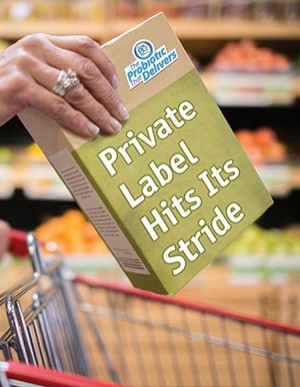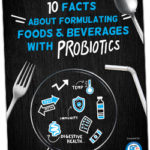Probiotics for Private Label

Market Stats
An ongoing shopper behavior study conducted by The Integer Group and M/A/R/C Research shows that shoppers seem to be keeping their private label shopping habits consistent year over year. Some shopper segments appear to be increasing their acceptance of private label with more than 1/3 of shoppers still saying that they are buying more private-label brands than last year. Of that group, one in three shoppers say they will probably buy even more in the future. Private label’s reputation overhaul and growing consumer loyalty owes itself to manufacturer focus on quality; now retailers can confidently say that products actually often taste as good and work as well as the national brands. Smart private label manufacturers and retailers offering store brands are now taking quality one-step further when introducing private label or value-added SKUs. These products one-up name brand cousins by offering something they don’t.And smart store brands like these boost their products with quality ingredients, health claims and appeal to special diets to up the ante.
One quality ingredient is BC30™ probiotic. The global market of probiotic ingredients, supplements, and foods is expected to reach $64 billion by 2023, according to Global Market Insights Inc. And as the market and education on probiotics increases, consumer awareness continues to grow; currently about 76% of consumers know what probiotics are and associate them with a health benefit. The most attractive opportunities and rampant growth areas of this burgeoning market lie in the food and beverage products sector. Now, innovations in temperature-stable strains mean that probiotics are no longer relegated to the dairy case and supplements aisle.
Go With BC30™
BC30 is a probiotic that can withstand the extreme manufacturing processes necessary for many foods and beverages – a real game changer for the category! How can a probiotic survive manufacturing you ask? BC30’s unique structure safeguards the cell’s genetic material from the extreme temperature and pressures involved in the manufacturing process, along with the challenges it’s exposed to during digestive transit. It is a Gram-positive spore-forming bacterium that, once germinated, produces L+ lactic acid, which supports good bacteria in the gut while displacing the harmful bacteria. Simply adding appropriate levels of BC30 to your product formulation allows you to say that it supports digestive and immune health.
Formulation Ideas
- Frozen pizza fortified with probiotics
- Probiotic refrigerated drink or juice
- Yogurt-covered snacks with probiotics in the coating
- Probiotic cereal, snack or protein bar
- Most any food or beverage application aimed at the private label market
To download this white paper, please fill out the form.
